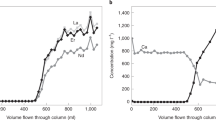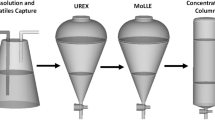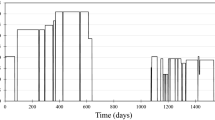Abstract
Until recently, it was thought that chemical elements were synthesized only in stars. The discovery of the Oklo phenomenon1–6 in 1972 revealed, however, that there was a nuclear ‘fire’ on the Earth 1,700 Myr ago. We have now carried out a series of acid-leaching experiments on a sample of uranium ore from reactor zone no. 10 of the Oklo mines in Gabon, Africa, and observe anomalously high 234U/238U ratios accompanied by modestly increased 235U/238U ratios in uranium fractions. These results, which can be interpreted as being due to the α-recoil effects of 238U and 239Pu, provide a convenient way of calculating the conversion factor (or the fraction of uranium atoms converted to plutonium) of the natural reactors from radiochemical data, obviating the necessity for mass-spectrometric measurements.
This is a preview of subscription content, access via your institution
Access options
Subscribe to this journal
Receive 51 print issues and online access
$199.00 per year
only $3.90 per issue
Buy this article
- Purchase on Springer Link
- Instant access to full article PDF
Prices may be subject to local taxes which are calculated during checkout
Similar content being viewed by others
References
Bouzigues, H., Boyer, R. J. M., Seyve, C. & Teulieres, P. The Oklo Phenomenon, 237–243 (IAEA, Vienna, 1975).
Bodu, R., Bouzigues, H., Morin, N. & Pfiffelmann, J. P. C. R. hebd Séanc. Acad. Sci., Paris 275D, 1731–1732 (1972).
Neuilly, M. et al. C. r. hebd. Séanc. Acad. Sci., Paris 275D, 1847–1849 (1972).
Baudin, G. et al. C. r. hebd. Séanc. Acad. Sci., Paris 275D, 2291–2294 (1972).
Kuroda, P. K. The Origin of the Chemical Elements and the Oklo Phenomenon, 31–55 (Springer, Berlin, 1982).
Kuroda, P. K. Naturwissenschaften 70, 536–539 (1983).
Cherdyntsev, V. V. Izd. Akad. Nauks SSR 175–233 (1955).
Cherdyntsev, V. V. Abundance of Chemical Elements (transl. Nichiporuk, W.) 107–110 (University of Chicago Press, 1961).
Cherdyntsev, V. V. Uranium-234 (in Russian) 1–308 (Atomezdat, Moscow, 1969).
Kigoshi, K. Science 173, 47–48 (1971).
Kobashi, A., Sato, J. & Saito, N. Radiochim. Acta 26, 107–111 (1979).
Kobashi, A. & Tominaga, T. Radiochim. Acta 30, 205–212 (1982).
Sakanoue, M. & Komura, K. Nature phys. Sci. 233, 80–81 (1971).
Fleischer, R. L. Science 207, 979–981 (1980).
Fleischer, R. L. General Electric Technical Information Ser. Rep. No. 81CRD228 1–11 (1981).
Fleischer, R. L. General Electric Technical Information Ser. Rep. No. 81CRD290 1–7 (1981).
Sakuragi, Y., Meason, J. L. & Kuroda, P. K. J. geophys. Res. 88, 3718–3724 {1983).
Hagemann, R., Devillers, C., Lucas, M., Lacomte, T. & Ruffenach, J.-C. The Oklo Phenomenon, 415–423 (IAEA, Vienna, 1975).
Neuilly, M. & Naudet, R. The Oklo Phenomenon, 541–556 (IAEA, Vienna, 1975).
Author information
Authors and Affiliations
Rights and permissions
About this article
Cite this article
Sheng, Z., Kuroda, P. The α-recoil effects of uranium in the Oklo reactor. Nature 312, 535–536 (1984). https://doi.org/10.1038/312535a0
Received:
Accepted:
Issue Date:
DOI: https://doi.org/10.1038/312535a0
This article is cited by
-
Alpha-recoil atoms of plutonium in the environment
Journal of Radioanalytical and Nuclear Chemistry Articles (1994)
-
Isotopic compositions of terrestrial thorium: A search in terrestrial thorium for the unidentified excess 4.6 meV alpha-activity of lunar thorium
Journal of Radioanalytical and Nuclear Chemistry Articles (1990)
-
Fractionation of thorium and uranium isotopes in the acid leaching experiments on monazite
Journal of Radioanalytical and Nuclear Chemistry Articles (1989)
-
Anomalous behaviours of protactinium in the acid-leaching experiments on pitchblende
Journal of Radioanalytical and Nuclear Chemistry Articles (1985)
Comments
By submitting a comment you agree to abide by our Terms and Community Guidelines. If you find something abusive or that does not comply with our terms or guidelines please flag it as inappropriate.



